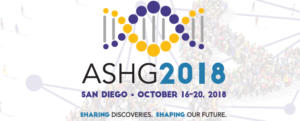GA4GH and ASHG conferences
Global lessons for our personalised medicine projects – GA4GH and ASHG conferences
At the end of last year have started several projects within the two major programmes: national one:
- Swiss Personalized Health Network (SPHN) and
- ETH-based: Personalized Health Research Technologies (PHRT)
They aim into finding novel solutions and at the same time applying in the clinical practice the principles of personalized (called also «precision») medicine. The programmes need state-of-the art IT infrastructures and providing them is the goal of the BioMedIT alliance.
Scientific IT Services takes part in several SPHN and PHRT projects and is one of the driving forces of the BioMedIT. We provide the computing infrastructure (LeonhardMed), data management solutions (openBIS), we also help and collaborate on data transfer between hospitals and academia, data analysis and security. Thus, SIS needs to actively follow the current status of knowledge and technological developments in the «hot topics» between the IT and precision medicine applications. Simply because it is largely driven by new achievements in IT, in particular in the areas such as systems security, big data, deep learning or novel collaborative methodologies.
In this post I would like to share some experience from recent scouting on the hotspots of IT for personalized medicine applications. Within the last month I have been to three major meetings. They varied in size and scope, but the final goal of the participants was the same: to boost the progress of current medicine with the use of modern technologies, including cutting-edge IT.
Global Alliance for Genomics and Health
The first meeting was GA4GH Alliance global meeting in Basel. GA4GH (Global Alliance for Genomics and Health) is an international, nonprofit alliance to accelerate the potential of research and medicine to advance human health. It aims mainly into use of genomics data, but its solutions are of importance for related areas of science and medicine too.
In Basel have been presented recent achievements of various workstreams of GA4GH, in particular: data security, regulatory and ethics, clinical data capture, cloud use, genomic knowledge standards, knowledge discovery, data use. All of them rooted their mission from the GA4GH document «Framework for Responsible Sharing of Genomic and Health-Related Data», emphasising often also «right to benefit from scientific research» as a new type of human right.
In the thematic sessions those workstreams presented standards and software solutions. For example interesting ones within data security have been talks on data leaks, mitigating risks and handling existing ones. On the other hand, some topics were very medical, such as e.g. anecdotal findings handling – trying to establish how a researcher should react when finds a new information about the patient, such as other disease vulnerability or existence or lack of genetically checked family ties (paternity) as a by-product of the main examination.
The metaphor for an IT person to understand the importance of GA4GH is that it is possible to compare this effort to W3C consortium in the times of writing the major RFC documents that shaped the Web technologies landscape. And this time – it is IT applicable directly to human health data. It is encouraging to know that establishing and applying data formats of providing appropriate IT tools can be nowadays turned almost directly in large-scale saving human lives and making people more healthy, so increasing their quality of life every day.
ASHG in California
Two other meetings took place in California. I have visited the ASHG, the largest world conference on human genetics. This year edition was held in San Diego. There is an european counterpart of this conference, but it is much smaller. ASHG has a number of satellite meetings around it. One of them was a 2-day workshop/hackaton on genomic variant curation, which is directly associated with the SVIP-O (Swiss Variant Interpretation Platform). The workshop was organized by the Griffith lab from Washington University, the research group that authored and maintains CIVIC – a system for genomic variant curation.
There were three main groups of participants at the workshop: clinicians who use the genomic variant knowledge for tuning the patients therapies, curators who enter the descriptive information into the knowledge bases and developers who need to create a useful system to enter data into this knowledge bases and provide them into clinical practice. The difficulty is that often those three groups have very differing background: medical, genetics and IT. Thus, they also have different daily vocabulary, toolboxes and needs. The workshop was an opportunity to understand each other better and design or start hacking practical solutions. I happened to be the only participant from Europe, while most of them were from research hospitals and universities in the US. It turned out that our SVIP-O initiative is a bit similar to one in Australia.
The main ASHG conference is a large meeting with many parallel sessions and plenary sessions with up to 10 thousand participants. Participants need to select and plan their programme in advance and have to cross kilometers along the large congress center to reach their sessions. But it is worth it, as the conference provides an unique mix of knowledge on medicine, technology, IT and clinical and commercial applications.
One of the important topics have been personalised health initiatives, which are running or planned in various countries or regions. Examples are the US programme, 100 thousand genomes in England, even more ambitious programme planned in France, sequencing entire populations of Iceland or Quatar or smaller but still well-funded projects in some US states or in Australia. Many of those programmes aim into full-genome sequencing of thousands of patients to get insight into the population-wide knowledge of genomes and their association with health: from precisely targeted therapies for individuals to optimising the global cost of healthcare. So the Swiss programmes are timely, but more targeted. Our programmes aim more into establishing closer collaboration between research and clinical side and setting up new types of medical screening facilities. In other countries it is often more towards undirected knowledge discovery from large genomes databases.
An interesting aspect of widespread genomic screening may be the possibility of genome hacking, which has some similarities to hacking known in IT. The type of attacks may include phenotype attribute disclosure, phenotype prediction, patient identity tracing, which includes genealogical triangulation (e.g. last name correlation with Y chromosome) or «side channel attacks» which may occur when by mistake one adds identifying data like the family name to a genomic file. Many of those attacks are not just theoretical, they occur on genomic databases and we may expect more of it in the future.
ASHG is also an important place where the research meets commercialisation. There is a significant interest of companies, that flocked over 300 booths and provided a number of presentations and sessions. One group of those commercial exhibitors have been companies facilitating medical data production, examples of large ones that provide also the equipment to the ETH core facilities are Illumina, PacBio, Qiagen, Oxford Nanopore or ThermoFisher. There was also a number of companies specialising in medical data analysis. Often they can sell complete data production pipeline – from medical hardware or lab kit to the data analysis, knowledge base or visualization solution. Examples here are WuXi, Sophia Genetics (Lausanne-based), DataBricks (scalable cloud solutions), Golden Helix, Phosphorus. Also Broad Institute, which is one of the largest sequencing facilities (MIT and Harvard initiative) provided a booth presenting own software for data analysis and data management in medicine.
ETH at ASHG
ETH was represented at ASHG by a good summary of personalised health proteomics, which was presented in the name of prof Aebersold by one of his postdocs, a plenary talk by Kjong Lehmann from Gunnar Rätsch lab and posters from those groups. SIS ID collaborates with both, also on personalized medicine projects.
Contact
Michal Okoniewski, Research Informatics, Scientific IT Services (ITS SIS)




